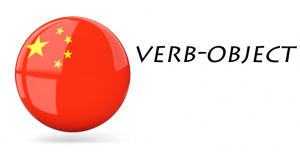Language/Mandarin-chinese/Grammar/Separable-verbs
Hello everybody!
In today's lesson, we will teach you how to use certain kinds of verbs that still need a complement.
"Separable verbs" get their name from their ability to "separate" into two parts (a verb part and an object part), with other words in between. In fact, you could also simply call separable verbs "verb-object phrases."
Feel free to edit this wiki page, if you think it can be improved.
Object verbs
If the verb 说 (shuō) "to speak" is followed by a complement, it is used alone:
- 说汉语. shuō hàn yǔ
I speak Chinese.
But if we simply mean "talk", we must add a "standard complement ": 话 huà word.
To say "He speaks.", we have to use 他说话 (Tā shuō huà) and not simply 他说 (Tā shuō).
We also have already seen "write" 写 (xiě) which requires the standard complement 字 (zì):
- 她写字 (Tā xiě zì).
She writes.
Attention, it is absolutely necessary to remove the standard complement when another complement is specified.
The following sentence is therefore false: 他 说话 汉语. (Tā shuō huà hànyǔ)
A verb-object may be heard alone, but in this case the complement is implied:
- (汉语)我会说,不会写. [(hàn yǔ) wǒ huì shuì, bú huì xiě]
(Chinese) I can speak it, but not write it.
Other Separable Verbs
Sources
https://resources.allsetlearning.com/chinese/grammar/Separable_verb
http://www.chine-culture.com/chinois/cours-de-chinois-6-grammaire.php

